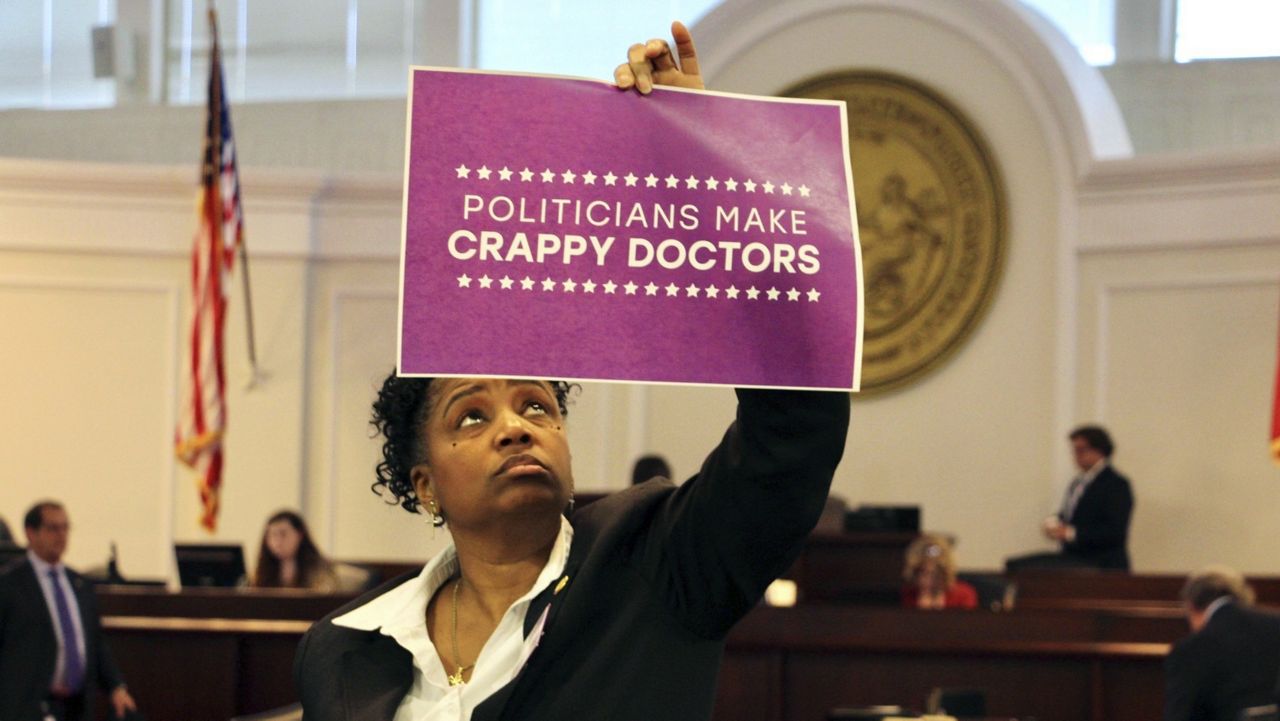North Carolina Gov. Roy Cooper says on Saturday, he will veto the General Assembly’s bill to ban most abortions after 12 weeks. He plans to sign the veto during an abortion-rights rally in downtown Raleigh.
In the meantime, Cooper, a Democrat, has made stops near Charlotte in Mecklenburg County, and in Wilmington, as he tried to flip at least one vote on the abortion bill. If Republicans lose one vote in the legislature, they will not have the three-fifths required to override the veto.
“Experts confirm that this legislation is not a 12-week ban as Republicans claim, but an extreme bill that bans many abortions altogether,” the governor said Tuesday in Mecklenburg County.
“Representatives Cotham and Bradford specifically promised to protect women’s reproductive freedom, and we want the people of Mecklenburg County to ask that they keep that promise,” he said, singling out Rep. Tricia Cotham, who switched parties to join the Republicans last month, and Rep. John Bradford.
Republican leaders in the General Assembly have said they are confident they can override a veto, but they will have to keep every member of their caucus together in both chambers to pull it off.
In New Hanover County Wednesday, the governor called out to Republicans, Rep. Ted David and Sen. Michael Lee.
Before the 2022 elections, Davis said he supported keeping North Carolina’s abortion law where it is with a 20-week cutoff. During last year’s campaign, Lee said he was opposed to banning abortion during the first trimester, about the first 12 weeks.

Currently in North Carolina, abortion is legal through 20 weeks of pregnancy. There is also a 72-hour waiting period between a woman’s first appointment with a doctor and getting an abortion.
The new bill would ban abortions after 12 weeks, with exceptions for rape and incest, the life of the mother and life-limiting fetal abnormalities.
It would also require women to see a doctor three times to get an abortion, which advocates say would put major barriers in the way for women who need to travel for an abortion, or have work or childcare obligations.
The bill was not passed in the usual manner with committee hearings and debate. After months of backroom negotiations, Republicans unveiled their proposal late on May 2. Using a parliamentary maneuver called a “proposed committee substitute,” the bill’s sponsors stripped the language from an existing bill and replaced it with the 46-page abortion legislation.
In less than 48 hours after the bill was released, it passed the North Carolina House and Senate with party-line votes in both chambers.

The messaging on the bill has been very different from each side of the abortion debate.
“The bill that’s been developed is a common sense, reasonable approach to restricting second- and third-trimester abortions,” Senate Leader Phil Berger said last week as Republican lawmakers unveiled the bill.
“The ‘Care for Women, Children, and Families Act’ is reasonable, commonsense legislation that will protect more lives than at any point in the last 50 years,” said Sen. Joyce Krawiec, a Forsyth County Republican. “We are beginning the process of creating a culture that values life, and that’s something we can all be incredibly proud of.”
Proponents of the bill point to $160 million in spending on what they call “pro-family measures,” including access to childcare, more paid parental leave for state employees and teachers, maternal health, foster care and other programs.
“I stand before you today as a passionate advocate for the sanctity of life,” said Sen. Amy Gayley, a Republican representing Alamance and Randolph counties. “I, along with many of the folks I serve with in this chamber, believe that every life from conception to natural death is precious and deserving of protection.”
“We must work to create a society that values and supports women rather than pushing them toward abortion as a solution,” she said during last week’s Senate debate. “We must provide education and resources that empower women to make informed and responsible decisions.”

But Democrats, who have uniformly opposed the bill, say it could effectively ban all abortions for women in rural areas.
“Despite Republican attempts to disguise this abortion ban as ‘mainstream,’ Senate Bill 20 would dramatically reduce access to abortion and could cause women’s health clinics across the state to shut down,” the governor’s office said this week.
“This bill is an extreme and oppressive step backwards for society, and one that will deny women the right to make decisions about their own health care and future,” Sen. Sydney Batch, a Wake County Democrat, said in the Senate debate last week.
“It is not common sense,” said Guilford County Democrat Sen. Gladys Robinson. “It is unfortunate that in 2023, Republicans believe they know better than women about their own bodies.”
She warned the bill could push women to seek unsafe options for abortions.
“This bill is not a women, children and family policy, it is a policy to pander to your Republican base,” Robinson said. “Let me be clear: personal freedoms and rights should not be up for discussion.”
With the governor expected to veto the bill Saturday, the legislature could take it up again next week. They will need to keep their supermajorities in the House and Senate on the same page to override Cooper’s veto. If they do, the new abortion law will go into effect July 1.
‘We only need one Republican in either the House or Senate to help sustain the veto of this dangerous abortion ban. Ted Davis, Michael Lee, John Bradford and Tricia Cotham promised to protect women’s reproductive freedom. There’s still time for them to keep their promises,” Cooper said on social media.




